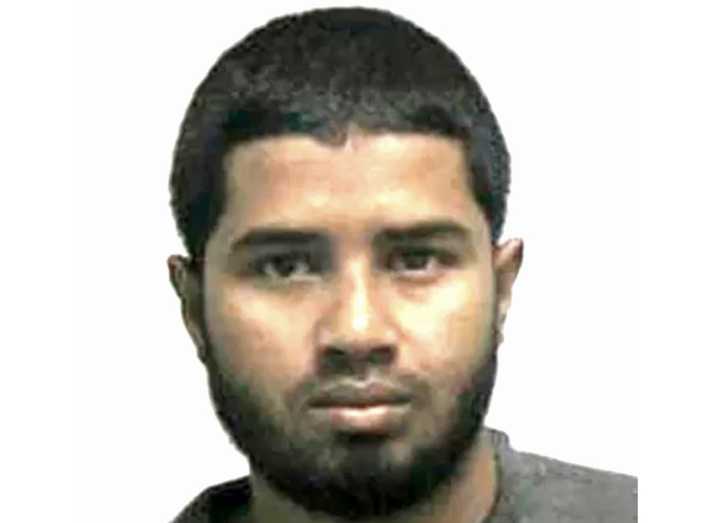Judge Richard J. Sullivan said the punishment fit the “heinous crime” when he sentenced Akayed Ullah for the December 2017 attack in subway tunnels beneath Times Square and the bus terminal.
Ullah, a 31-year-old Bangladeshi immigrant, began researching how to build a bomb about a year before the attack, federal authorities said.
That morning, packed a homemade device with metal screws before taking two trains from his Brooklyn apartment to Manhattan, federal authorities said.
On his way, he posted a message on Facebook: “O Trump you fail to protect your nation.”
Getting off at the Port Authority, he entered the passageway and detonated the bomb.
Fortunately, it malfunctioned and only partially exploded, seriously injuring him, authorities said.
It was a miracle, they said, that the only other injuries involved a pedestrian strugk in the leg by shrapnel and two others partially losing their hearing.
Ullah used a nine-volt battery inside a pants pocket to detonate the bomb – a metal pope filled with an explosive substance that included match heads and sugar -- which was strapped with plastic zip ties to his chest and connected to wires running underneath his jacket, investigators said.
He admitted under questioning that he conducted the terrorist attack on behalf of the Islamic State of Iraq and al-Sham (ISIS), they said.
When it came time for trial, Ullah claimed that he was depressed and wanted to kill himself and not injure others. He’d gone through a personal crisis that left him “isolated, depressed, vulnerable and suicidal,” his lawyer argued.
Jurors didn’t buy it when they convicted Ullah in November 2018 of using a weapon of mass destruction, bombing a public transportation system and providing material support to a foreign terrorist organization.
Neither did the judge.
Sullivan earlier this year rejected a bid by Ullah’s lawyer to throw out the conviction.
Rather, he said, the evidence clearly showed that Ullah acted as an agent of ISIS by “heeding the call of the organization’s propaganda and recruiting materials.”
Prosecutors also pointed to post-arrest statements and social medial comments by Ullah – including his calling out then-President Trump on Facebook -- and an ISIS slogan he’d posted indicating he was acting on behalf of the terrorists.
Ullah got an entry visa in 2011 thanks to an uncle who was already a U.S. citizen, a practice that Trump had said threatened national security.
Speaking on his own behalf, Ullah expressed remorse while apologizing to the victims, law enforcement and the United States, saying he doesn’t support “haming innocent people.”
"Finally, I apologize to my family, whose lives have been ruined by my actions. I am sorry," he said.
Federal authorities were unmoved.
“Ullah’s motive was clear and unambiguous: a deeply held ideological hatred for America,” said U.S. Attorney Audrey Strauss for the Southern District of New York. “Ironically, Ullah’s actions resulted only in reaffirming the greatness of America by displaying the fairness and impartiality for which our justice system stands.
“Ullah received a speedy, fair, public trial, and was convicted by a jury of his peers. [His] Ullah’s message of hatred clearly backfired; his just sentence of life in prison only exemplifies that cowardly acts of terrorism will be met with law enforcement’s unwavering resolve to protect our core values of freedom and democracy.”
Assistant Attorney General John Demers and Strauss praised the work of the FBI, NYPD and Port Authority Police Department in the case.
They also cited the cooperation of Strauss’s office, the Justice Department’s National Security Division and the FBI’s New York Joint Terrorism Task Force for its work in obtaining the verdict, secured by Assistant U.S. Attorneys Rebekah Donaleski and George D. Turner for the Southern District of New York assisted by Trial Attorneys Jason Denney and Felice Viti of the National Security Division’s Counterterrorism Section.
Click here to follow Daily Voice Bethlehem and receive free news updates.
